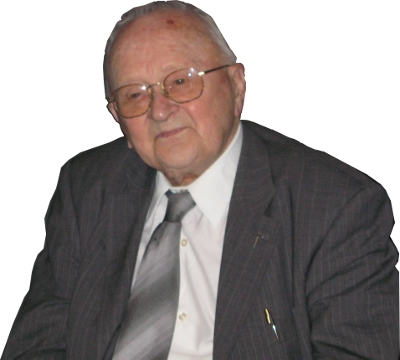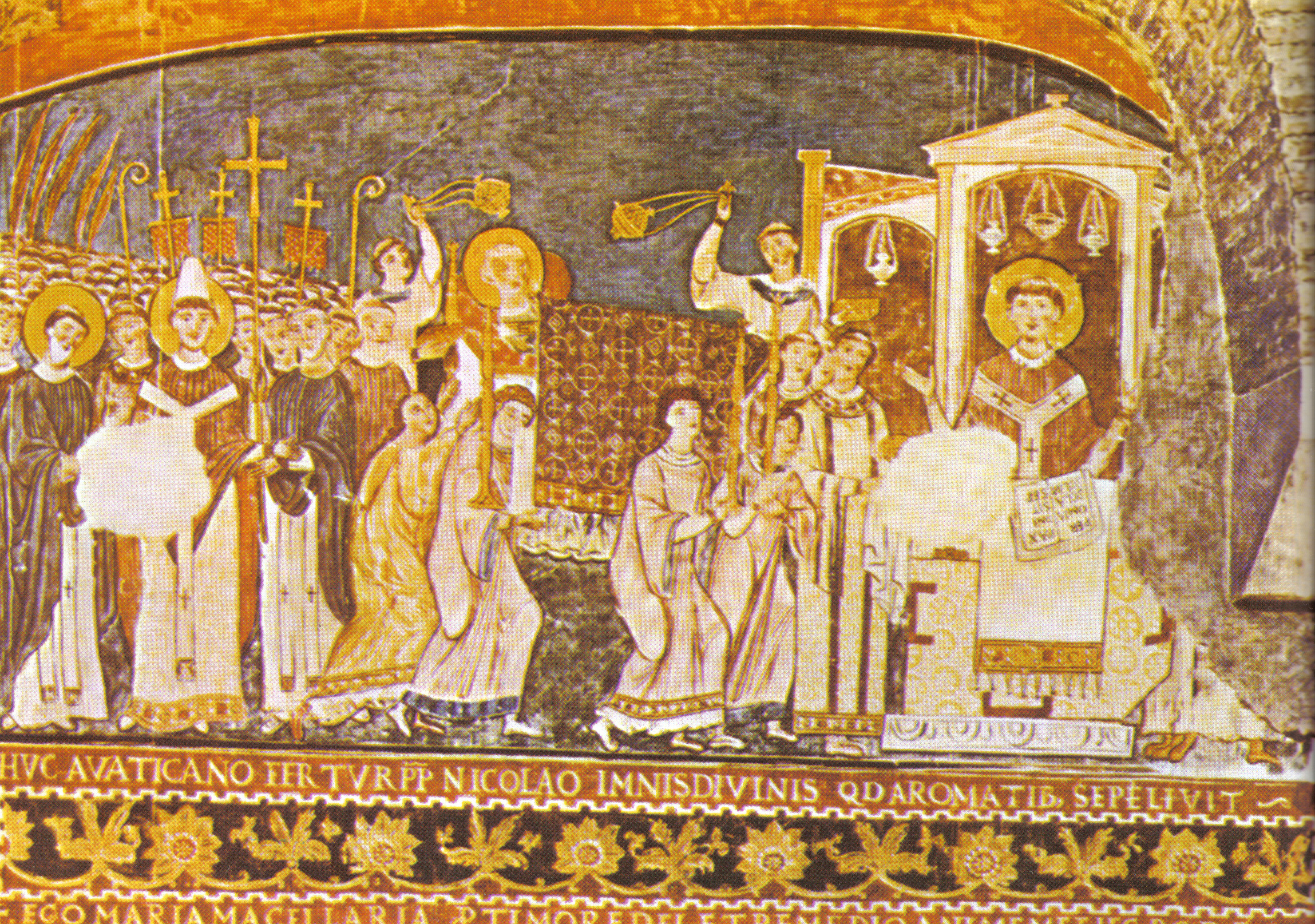|
Michel Spanneut
Michel Spanneut (6 November 1919 in Steenvoorde – 28 April 2004 in Lomme) was a French priest and patristics scholar. From a Flemish speaking agricultural family in the Nord Département, after primary school he entered the Petit séminaire at Hazebrook. Following studies at the Université Catholique de Lille, where he obtained a doctorate in theology, and ordination to the priesthood in 1944, he completed a doctorat d' état under the direction of Henri-Irénée Marrou devoted to the influence of Stoic philosophy on Church Fathers from Clement of Rome to Clement of Alexandria (i.e. prior to or competing with various stages of Platonism). The permanence of Stoicism in Western thought remained one of his major preoccupations. Some of his early publications dealt with Eustathius of Antioch. A teacher at the Université Catholique de Lille from 1955 to 1989 he became Dean of the Faculty of Letters. He was an honorary canon of Lille. In 2007 he donated his correspondence (1933� ... [...More Info...] [...Related Items...] OR: [Wikipedia] [Google] [Baidu] |
Michel Spanneut En 2009
Michel may refer to: * Michel (name), a given name or surname of French origin (and list of people with the name) * Míchel (nickname), a nickname (a list of people with the nickname, mainly Spanish footballers) * Míchel (footballer, born 1963), Spanish former footballer and manager * ''Michel'' (TV series), a Korean animated series * German auxiliary cruiser ''Michel'' * Michel catalog, a German-language stamp catalog * St. Michael's Church, Hamburg or Michel * S:t Michel, a Finnish town in Southern Savonia, Finland People * Alain Michel (other), several people * Ambroise Michel (born 1982), French actor, director and writer. * André Michel (director), French film director and screenwriter * André Michel (lawyer), human rights and anti-corruption lawyer and opposition leader in Haiti * Anette Michel (born 1971), Mexican actress * Anneliese Michel (1952 - 1976), German Catholic woman undergone exorcism * Annett Wagner-Michel (born 1955), German Woman International ... [...More Info...] [...Related Items...] OR: [Wikipedia] [Google] [Baidu] |
Nord (French Department)
Nord (; officially french: département du Nord; pcd, départémint dech Nord; nl, Noorderdepartement, ) is a department in Hauts-de-France region, France bordering Belgium. It was created from the western halves of the historical counties of Flanders and Hainaut, and the Bishopric of Cambrai. The modern coat of arms was inherited from the County of Flanders. Nord is the country's most populous department. It had a population of 2,608,346 in 2019.Populations légales 2019: 59 Nord INSEE It also contains the metropolitan region of (the main city and the prefecture of the [...More Info...] [...Related Items...] OR: [Wikipedia] [Google] [Baidu] |
Université Catholique De Lille
The Université catholique de Lille (also known as the Catholic University of Lille), also « University and Polytechnic Federation of Lille » is a private collegiate university of Catholic-inspired institutions established in 1875. The university comprises five faculties, 20 schools and institutes, research centers, and a hospital, with a cumulative student body of 36,700 in 2021. Although an article of the French Code of Education (L731-14) prohibits private institutes from calling themselves “Universities”, the federation calls itself “Université catholique de Lille" or "Catholic University of Lille”. It is under this name that it improperly communicates, both in France and abroad. It should not be confused with the University of Lille. History The year of the Wallon Law of 12 July 1875 freeing up higher education, the Catholic University of Lille was founded by a committee of lay Ultramontanes including Philibert Vrau, "embarrassed" by the absence of such a st ... [...More Info...] [...Related Items...] OR: [Wikipedia] [Google] [Baidu] |
Doctorat D' état
A doctorate (from Latin ''docere'', "to teach"), doctor's degree (from Latin ''doctor'', "teacher"), or doctoral degree is an academic degree awarded by universities and some other educational institutions, derived from the ancient formalism ''licentia docendi'' ("licence to teach"). In most countries, a research degree qualifies the holder to teach at university level in the degree's field or work in a specific profession. There are a number of doctoral degrees; the most common is the Doctor of Philosophy (PhD), awarded in many different fields, ranging from the humanities to scientific disciplines. In the United States and some other countries, there are also some types of technical or professional degrees that include "doctor" in their name and are classified as a doctorate in some of those countries. Professional doctorates historically came about to meet the needs of practitioners in a variety of disciplines. Many universities also award honorary doctorates to individuals de ... [...More Info...] [...Related Items...] OR: [Wikipedia] [Google] [Baidu] |
Henri-Irénée Marrou
Henri-Irénée Marrou (; 12 November 1904 in Marseilles – 11 April 1977 in Bourg-la-Reine) was a French historian. A Christian humanist in outlook, his work was primarily in the spheres of Late Antiquity and the history of education. He is best known for his work ''History of Education in Antiquity''. He also edited, for Sources Chrétiennes, the early Christian work ''Letter to Diognetus'', the only manuscript of which perished in a fire at the University of Strasbourg during the Franco-Prussian War. Marrou edited the collection Patristica Sorbonensia, published by Le Seuil. His work has been criticised by the philosopher Ilsetraut Hadot. Marrou also wrote under the pseudonym of Henri Davenson. His ''Carnets posthumes'' were published in 2006 under the editorial supervision of his daughter Françoise Marrou-Flamant. He was elected a foreign member of the Royal Netherlands Academy of Arts and Sciences in 1967. Publications * ''Fondements d'une culture chrétienne'', P ... [...More Info...] [...Related Items...] OR: [Wikipedia] [Google] [Baidu] |
Clement Of Rome
Pope Clement I ( la, Clemens Romanus; Greek: grc, Κλήμης Ῥώμης, Klēmēs Rōmēs) ( – 99 AD) was bishop of Rome in the late first century AD. He is listed by Irenaeus and Tertullian as the bishop of Rome, holding office from 88 AD to his death in 99 AD. He is considered to be the first Apostolic Father of the Church, one of the three chief ones together with Polycarp and Ignatius of Antioch. Few details are known about Clement's life. Clement was said to have been consecrated by Peter the Apostle, and he is known to have been a leading member of the church in Rome in the late 1st century. Early church lists place him as the second or third bishop of Rome after Peter. The '' Liber Pontificalis'' states that Clement died in Greece in the third year of Emperor Trajan's reign, or 101 AD. Clement's only genuine extant writing is his letter to the church at Corinth (1 Clement) in response to a dispute in which certain presbyters of the Corinthian church had been deposed ... [...More Info...] [...Related Items...] OR: [Wikipedia] [Google] [Baidu] |
Clement Of Alexandria
Titus Flavius Clemens, also known as Clement of Alexandria ( grc , Κλήμης ὁ Ἀλεξανδρεύς; – ), was a Christian theologian and philosopher who taught at the Catechetical School of Alexandria. Among his pupils were Origen and Alexander of Jerusalem. A convert to Christianity, he was an educated man who was familiar with classical Greek philosophy and literature. As his three major works demonstrate, Clement was influenced by Hellenistic philosophy to a greater extent than any other Christian thinker of his time, and in particular, by Plato and the Stoics. His secret works, which exist only in fragments, suggest that he was familiar with pre-Christian Jewish esotericism and Gnosticism as well. In one of his works he argued that Greek philosophy had its origin among non-Greeks, claiming that both Plato and Pythagoras were taught by Egyptian scholars. Clement is usually regarded as a Church Father. He is venerated as a saint in Coptic Christianity, Eastern Ca ... [...More Info...] [...Related Items...] OR: [Wikipedia] [Google] [Baidu] |
Stoicism
Stoicism is a school of Hellenistic philosophy founded by Zeno of Citium in Athens in the early 3rd century Common Era, BCE. It is a philosophy of personal virtue ethics informed by its system of logic and its views on the natural world, asserting that the practice of virtue is both necessary and sufficient to achieve Eudaimonia, (happiness, ): one flourishes by living an Ethics, ethical life. The Stoics identified the path to with a life spent practicing the cardinal virtues and living in accordance with nature. The Stoics are especially known for teaching that "virtue is the only good" for human beings, and that external things, such as health, wealth, and pleasure, are not good or called in themselves (''adiaphora'') but have value as "material for virtue to act upon". Alongside Aristotelian ethics, the Stoic tradition forms one of the major founding approaches to virtue ethics. The Stoics also held that certain destructive emotions resulted from errors of judgment, and th ... [...More Info...] [...Related Items...] OR: [Wikipedia] [Google] [Baidu] |
Eustathius Of Antioch
Eustathius of Antioch, sometimes surnamed the Great, was a Christian bishop and archbishop of Antioch in the 4th century. His feast day in the Eastern Orthodox Church is February 21. Life He was a native of Side in Pamphylia. About 320 he was bishop of Beroea, and he became patriarch of Antioch shortly before the Council of Nicaea in 325. In that assembly he distinguished himself zealously against the Arians, though the ''Allocutio ad Imperatorem'' with which he has been credited is probably not by him. His anti-Arian polemic against Eusebius of Nicomedia made him unpopular among his fellow bishops in the East, and a synod convened at Antioch in 330 deposed him for adultery, which was confirmed by the emperor. In the dispute with Eustathius of Antioch, who opposed the growing influence of Origen and his practice of an allegorical exegesis of scripture, seeing in his theology the roots of Arianism, Eusebius, an admirer of Origen, was reproached by Eustathius for deviating from ... [...More Info...] [...Related Items...] OR: [Wikipedia] [Google] [Baidu] |
Maxence Van Der Meersch
Maxence Van der Meersch (4 May 1907 – 14 January 1951) was a French Flemish writer. Life Maxence, of delicate health, came from a relatively well off family — his father was an accountant. On 27 October 1918, he lost his sister, Sarah, who was just 19 years old, to tuberculosis, the disease that would eventually kill him too. His parents' marriage broke up. Marguerite, his mother, became an alcoholic, and his father, Benjamin, lived a life considered dissolute by the standards of the times. In 1927, Maxence fell in love with Thérèze Denis, a poor working-class girl, with whom he lived in Wasquehal, against the wishes of his father, who dreamt of a more prestigious union for his son. In 1929, from this union that was only regularised in 1934, a daughter, Sarah, was born, named in memory of his sister. Thérèze was the only love of Maxence's life and is the key to an understanding of his work. She was the inspiration for the protagonist of his trilogy ''La Fille pauvre'' (''T ... [...More Info...] [...Related Items...] OR: [Wikipedia] [Google] [Baidu] |
Patristica Sorbonensia
{{primary sources, date=June 2008 Patristica Sorbonensia was a collection of academic works on patristically related themes, edited by Henri-Irénée Marrou and published by Le Seuil. The volumes include: 1 Michel Spanneut; Le Stoicisme des Pères de l'Eglise, de Clément de Rome à Clément d'Alexandrie, 1957. 2 Marguerite Harl:Origène d'Alexandrie et la fonction révélatrice du Verbe Incarné, 1958. 3 Jean Meyendorf: Introduction à l'étude de Grégoire Palamas, 1959. 4 Pierre Riché: Education et culture dans l'Occident barbare VIe-VIIIe siècles, 1962. 5 Antoine Guillaumont: Les 'kephalaia gnostica' d'Evagre le Pontique et l'histoire de l'origénisme chez les Grecs et chez les Syriens, 1962. 6 Annie Jaubert: La notion d' Alliance dans le judaïsme aux abords de l'ère chrétienne, 1963. 7 André Méhat: Etude sur les "Stromates" de Clément d'Alexandrie. 8 Michel Meslin: Les Ariens d'Occident 335–430, 1967. 9 Henri-Irénée Marrou Henri-Irénée Marrou (; 12 No ... [...More Info...] [...Related Items...] OR: [Wikipedia] [Google] [Baidu] |



_-_Foto_G._Dall'Orto.jpg)
_-_BEIC_6353768.jpg)
